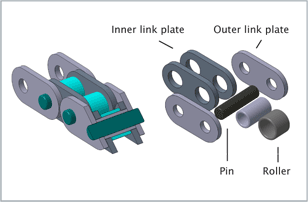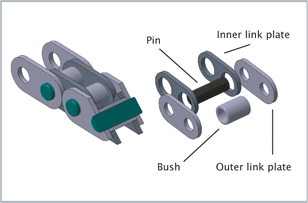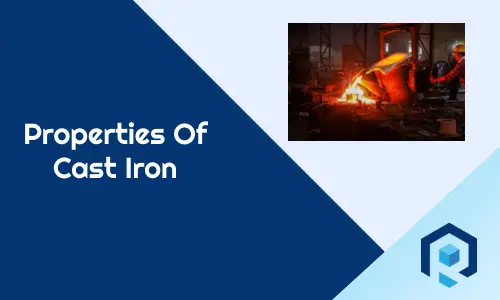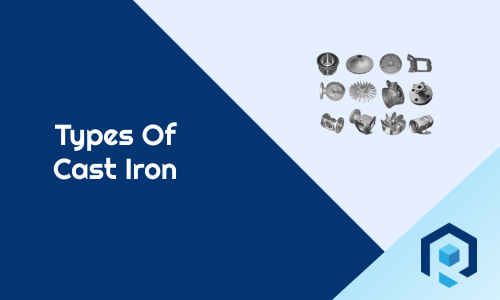Timing chains are widely used in automobiles and other machinery and are often considered as a better alternative to a timing belt. It is always preferred because of less wear and tear at the cost of regular maintenance. Let’s learn more about the timing chain in this article.
What Is a timing chain?
A Timing chain is a closed-loop chain drive that contains teeth on the internal surface which connects the crankshaft and the camshaft on the Internal Combustion (IC) engine. It is used to ensure the opening and closing of the inlet valve and exhaust valve of the engine at the precise valve timing which is responsible for the fuel intake and the release of exhaust gases
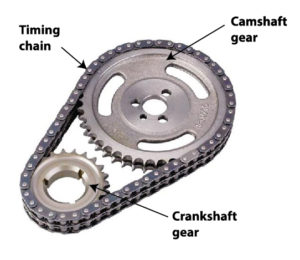
Timing chain types
The timing chain is generally classified into two types. These types are based on the design of the timing chain.
- Roller timing chain
- Non-roller timing chain
Roller timing chain
The Roller timing chain consists of cylindrical or spherical rollers or bush. The roller chains can also be a single strand or multiple strands depending upon the application and requirement.
Roller chains are comparatively lighter than non-roller chains. Due to the rollers, the wear is less so it is more durable and can be used at a high-speed rpm.
Non-roller timing chain
Non-roller chain is simply a toothed link chain. It has different types like silent chains, leaf chains, flat-top chains, and engineering steel chains. The most common type which is used in industries is the silent timing chain.
Silent timing chain
The silent timing chain is made up of series of vertically bundled metal link plates connected by the cylindrical pin where the plates were made by the counter of the gear so that they can mesh effectively.
It is preferred where the noise has to be low, cost-effective, and simple in design & operation.
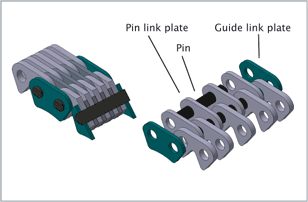
Timing chain applications
- Timing chains are used in Internal combustion (IC) engines of Passenger Cars, Light commercial vehicle, heavy commercial vehicle, hybrid electric vehicle, plug-in hybrid electric vehicle and motorcycle.
- Timing chain is used in engines to transmit the power (i.e) rotational motion from the crank shaft to the camshaft synchronously.
Advantages of timing chain
- Timing chain has high strength due to its material and design.
- The life period of the timing chain is relatively higher than timing belts.
- The timing chain can resist heat produced from the engine.
- The timing chain also acts as a damper which dampens the vibration from the crankshaft.
- The timing chain does not slip.
- It can be used for high-power applications.
Disadvantages of timing chain
- The chain needs to be constantly lubricated by the engine oil.
- Oil maintenance is necessary at regular intervals.
- If maintenance fails, it will be Worn out easily and cause stretch out of chain. Stretching of chain leads to create noise, rough idle time of valves which leads to excessive emissions and wear leads to the production of metallic debris in the oil.
- If the timing chain fails, it will cause more damage to the crankshaft, cylinder head and engine block.
- The timing chain is quite heavier and it leads to an increase in fuel consumption which proportionally decreases the efficiency of the engine.
Timing belt vs timing chain: what is the difference
| Parameter | Timing Belt | Timing Chain |
|---|---|---|
| Material | Reinforced Rubber | Metal |
| Lubrication | Not required | Required |
| Noise | Low | High |
| Vibration | Low | High |
| Suitable for | Transferring power between long distance | Only suitable for a short distance |
| Size | Large | Small |
| Servicing | Easy | Tough |
| Lifespan | Need frequent replacement | Can sustain the whole product life |
| Cost | Low | High |
Conclusion
That’s all we have in this article. I hope you got a fair idea about the timing chain and what are the differences between a timing belt and a timing chain. If you still have any questions, please write in the comment section and I will be happy to respond to you back.
You may also like to read:
Turbocharger vs supercharger
Here is an interesting article on the labor market
Trends in the Labor market 2020-2021
About The Author

Deepthi is a Production Engineering graduate from Government College of Technology, Tamilnadu. Mentoring students for 2+ years on technical and interpersonal skills. Co-founder of Edtech startup ‘KnackEdu’. Technical event organizer for 3+ years. Worked on various startups, automotive events, and research projects. Exploring the field of supply chain management, CAD, CAM, and FEA.
